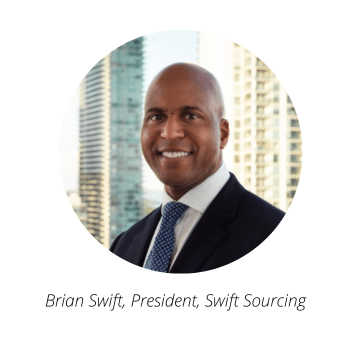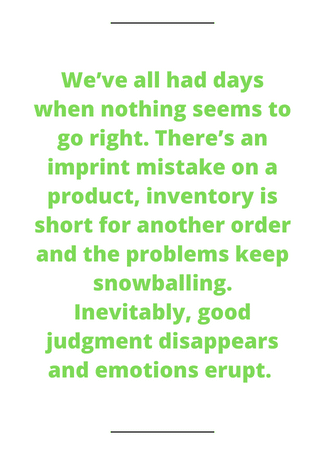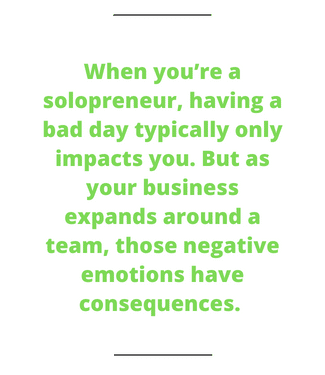(Editor’s Note: PPAI Media’s Voices series introduces the opinions, experience and advice of promo industry influencers. The opinions and ideas belong to the individual writer.)
One of the biggest revelations I’ve had while growing my overseas team is seeing how my emotions impact them. As the business owner, my energy permeates the company, and the employees feed off this energy – good or bad.
Over time, I’ve seen that when the team senses I’m stressed out, they get stressed out, too. Conversely, when I am pumped up and excited about a project, they respond with increased energy and enthusiasm.

To be a more effective leader, I’ve had to work on my emotional intelligence.
What Is Emotional Intelligence?
Emotional intelligence is “the ability to recognize, understand and deal skillfully with one’s own emotions and the emotions of others, as by regulating one’s emotions or by showing empathy and good judgment in social interactions.” Some describe it as EQ, the emotion-based counterpart to IQ.
We’ve all had days when nothing seems to go right. There’s an imprint mistake on a product, inventory is short for another order and the problems keep snowballing. Inevitably, good judgment disappears and emotions erupt. If this happens in front of your team, it impacts their emotions and, ultimately, their performance.

I learned this lesson the hard way. Once, when I was angry with a supplier over a mistake, the frustration trickled down and impacted how my team interacted with that supplier. Not only did I have to fix the issue with the supplier, but I also had to fix the disruption in my team.
While having emotional intelligence is imperative for promo company ownership and management, we also want our team members to be emotionally intelligent in their roles.
I’ve found that having strong emotional intelligence as the leader of the organization also cultivates emotional intelligence within my team. If I can stay cool during a stressful situation and maintain rationality when emotions flare, then my team will take cues from my behavior and mirror it when they encounter similar circumstances.
The Relationship Between EQ And Leadership Skills
Emotions impact a lot of critical leadership skills – accountability, communication, empathy, teamwork and trust, to name a few. When looking at these skills as interconnected parts of a company’s operations, it’s easy to imagine how there can be a cascading effect when emotions run amok.
Take tolerance to stress, for example. Think of times when you were stressed out. Most likely in those situations, it becomes easy to get angry, which leads to being less empathetic with others, which leads to less effective communication and decision-making.
On the other hand, when emotions are balanced, it’s much easier to be flexible and roll with what the day brings, which increases tolerance to change and promotes better teamwork.
When you’re a solopreneur, having a bad day typically only impacts you. But as your business expands around a team, those negative emotions have consequences.

3 Quick Ways To Get Your Emotions In Check
Being on an emotional rollercoaster isn’t healthy for you or your company. While there are many techniques for stabilizing emotions so you can continue being an effective leader, I have found that these three work for me and are a good place to start.
- Take a breath (literally). It’s easy to discount the effectiveness of something so simple, but breathing exercises have been proven to help change emotions by altering the signals traveling to the brain.
In fact, Dr. Patricia Gerbarg, an assistant clinical professor of psychiatry at New York Medical College and coauthor of The Healing Power of the Breath, says that brain scans show slower breathing has multiple benefits, including reducing anxiety and fear while increasing the ability to reason. As a result, the thinking mind restrains the emotional part of the mind and helps a person evaluate the situation better.
To begin, check out Dr. Gerbarg’s easy breathing exercises here.
- Understand the difference between reaction and response. Another benefit of taking a breath is that you insert a pause into a situation so you can delay an emotional reaction and instead determine a measured response.
Reacting is part of our fight-or-flight survival instincts, but it may not result in desirable outcomes. Responding, however, includes deliberate thinking and thoughtful decision-making.
So, the next time a vendor makes a mistake on an order, think about responding instead of reacting. Rather than yelling and accusing them of being incompetent (a reaction), take a breath, pause and determine how to best communicate the ideal solution (a response).
- Know your triggers and create a plan. Is there something your team does that drives you crazy and causes you to overreact? Perhaps it’s how they communicate inconsistently about order details, or maybe it’s how PTO is being tracked that creates last-minute staffing problems.
Whatever the trigger is, look at how you can build a system or process around the issue to reduce the friction and net the outcome you want.
READ MORE: Want to learn more about emotional intelligence? Check out these resources from Harvard Professional Development.
Emotional Intelligence Predicts Success
While emotional intelligence can lead to a more cohesive team culture and better working relationships, it also impacts the bottom line.
According to emotional leadership training service TalentSmart, EQ impacts 58% of job performance, and 90% of top performers have high EQ. Additionally, the global demand for EQ skills is set to increase six times in the next three to five years.
That’s not all. The World Economic Forum found that people with a high degree of EQ make more money – an average of $29,000 more per year than people with a low degree of EQ. In fact, “the link between emotional intelligence and earnings is so direct that every point increase in emotional intelligence adds $1,300 to an annual salary. These findings hold true for people in all industries, at all levels, in every region of the world.”
The lesson: While technical skills and work experience are often prioritized during the hiring process, don’t discount how emotional intelligence (or lack thereof) can influence your team, company culture and the overall success of your business.
Swift is president of Miami, Florida-based Swift Sourcing (PPAI 230767, D3) and a former PPAI board member. He is a graduate of the Goldman Sachs 10,000 Small Businesses program and currently participates in the EY Entrepreneurs Access Network program for Black and Hispanic/Latino entrepreneurs seeking to put their businesses on a path for broad-scale growth.


